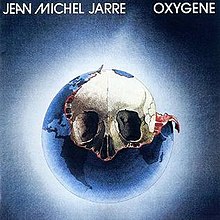Oxygène
| Oxygène | ||||
|---|---|---|---|---|
 |
||||
| Studio album by Jean-Michel Jarre | ||||
| Released | 5 December 1976 | |||
| Recorded | August–November 1976, Paris | |||
| Genre | Electronica, new-age, ambient, chill-out | |||
| Length | 39:44 | |||
| Label | Disques Dreyfus/Polydor | |||
| Producer | Jean-Michel Jarre | |||
| Jean-Michel Jarre chronology | ||||
|
||||
| Singles from Oxygène | ||||
|
||||
| Professional ratings | |
|---|---|
| Review scores | |
| Source | Rating |
| AllMusic | |
| Melody Maker | average |
| Music Week | unfavourable |
| NME | unfavourable |
Oxygène (English: Oxygen) is the third studio album by French electronic musician and composer Jean-Michel Jarre, and his first album not intended for use as a soundtrack. Oxygène consists of six tracks, numbered simply "Oxygène Part I" to "Part VI". It was first released in France in December 1976, on the Disques Dreyfus record label licensed to Polydor, with an international release following in the middle of 1977. The album reached number one on the French charts, number two on the UK charts and number 78 in the US charts.
Jarre recorded the album in a makeshift home recording studio using a variety of analog synthesizers, one digital synthesizer as well as other electronic instruments and effects. It became a bestseller and was Jarre's first album to achieve mainstream success. It was highly influential in the development of electronic music from that point onward and has been described as the album that "led the synthesizer revolution of the Seventies" and "an infectious combination of bouncy, bubbling analog sequences and memorable hook lines".
Prior to 1976, Jarre had dabbled in a number of projects, including an unsuccessful synthesizer music album, advertising jingles and compositions for a ballet. His inspiration for Oxygène came from a painting by the artist Michel Granger (given to Jarre by his future wife Charlotte Rampling), which showed the Earth peeling to reveal a skull. Jarre obtained the artist's permission to use the image for this album.
Jarre composed Oxygène over a period of eight months using a number of analogue synthesizers and an eight-track recorder set up in the kitchen of his apartment. However, he found it difficult to get the record released, not least because it had "No singers, no proper [track] titles, just 'I', 'II', 'III', 'IV', 'V' and 'VI'".
The motif of the track "Oxygène Part IV" is a variation on a phrase from "Popcorn" by Gershon Kingsley, which Jarre himself had previously covered under the pseudonyms of "Pop Corn Orchestra" and "Jamie Jefferson". The drum sounds were produced using two presets simultaneously on a Korg Mini Pops drum machine.
...
Wikipedia
